Elliott Smith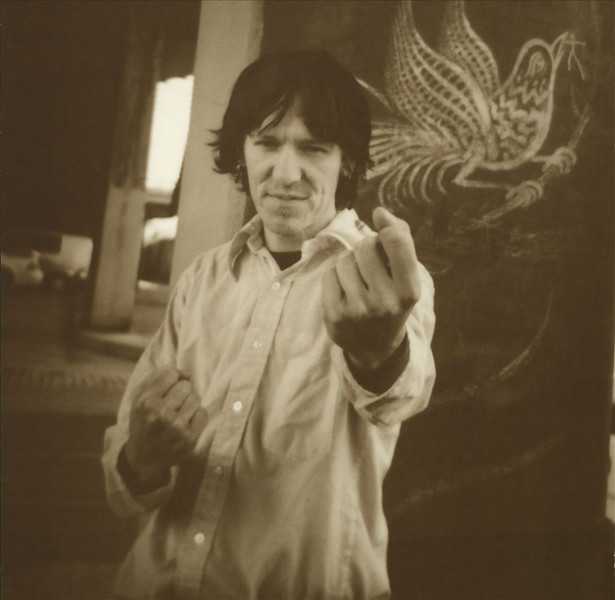 | ||
| Allmusic Biography : An acclaimed singer/songwriter with a distinctively melancholic sound, Elliott Smith was a member of the thriving music scene of Portland, Oregon in the mid-90s when he began releasing a series of highly influential solo albums. His musical palette expanded over time, from the hushed acoustic guitar demos of his 1994 solo debut, Roman Candle, to the orchestrated studio craftsmanship of his fifth album, 2000s Figure 8. Still, all were distinguished by a vulnerable demeanor conveyed by intense but wispy vocals (often double-tracked) and personal lyrics that referred candidly to subjects like addiction, depression, and alienation. His musics character was also shaped by artful chord transitions, which he called his favorite part of songs. He moved abruptly from indie cult status to mainstream success in 1997 when his contributions to the Good Will Hunting soundtrack resulted in an Academy Award nomination ("Miss Misery"). He recorded only six solo albums, releasing five before his untimely death at the age of 34 in 2003. Born Stephen Paul Smith in Omaha, Nebraska but raised mostly in Texas, Elliott Smiths musical influences included such figures as Bob Dylan, the Kinks, Big Star, Elvis Costello, and the Beatles; he said he was inspired to become a musician after hearing The White Album. He began writing and recording his first songs around the time he moved to Portland, Oregon at the age of 14. After high school, Smith headed to Amherst, Massachusetts to study philosophy and political science at Hampshire College. It was there that he met future bandmate Neil Gust. After graduating in 1991, Smith moved back to Portland with Gust, and the co-singer/songwriter/guitarists formed the indie rock band Heatmiser with bass player Brandt Peterson and drummer Tony Lash. Mixing Smiths melancholy-pop sensibilities with Gusts more aggressive style and a notable grunge influence, they signed with Frontier Records, which released 1993s Dead Air and 1994s Cop and Speeder. Peterson then left the group and was replaced by Sam Coomes. In the meantime, Smiths then-girlfriend convinced him to send some of his solo demos to Portland-based Cavity Search Records. The label immediately expressed interest in releasing a full album. A set of spare acoustic guitar ruminations with just a few other instruments used as accents, Roman Candle was home-recorded on a four-track tape recorder. Four of the songs didnt even have titles. It stood in sharp contrast to the scenes alternative rock that was popular upon its release in 1994. He signed with noted indie label Kill Rock Stars for the next years Elliott Smith. It was recorded partly at his bandmate Lashs house and featured Gust on additional guitar. The attention the records received soon overshadowed Heatmiser, though they helped draw the interest of Virgin Records, which signed the band for their final LP, Mic City Sons. It arrived via subsidiary Caroline Recordings in 1996. Heatmiser officially disbanded prior to its release. As Smith continued to develop as a songwriter, his more ambitious but entirely self-recorded third solo LP, Either/Or, arrived in early 1997. With its title taken from a Søren Kierkegaard book of the same name, the albums expanded instrumentation included several songs with full-band arrangements and even keyboards. The results were still intimate, however, marked by his whispery, often despondent delivery and lyrics, even among a few livelier, uptempo tracks. The album was mixed by Smith and Heatmiser producers Tom Rothrock and Rob Schnapf. By then, Smith had made a fan of film director Gus Van Sant, who asked for permission to use his music in an upcoming film. Counting an orchestral version of "Between the Bars" recorded with score composer Danny Elfman, four of his existing songs could be heard in the critical and box office hit Good Will Hunting later in 1997. The soundtrack also included Smiths original song for the film, "Miss Misery." When the Academy Award nominations were announced the following February, the track was a surprise entry in the Best Original Song category. Although it didnt win, Smith performed an acoustic guitar rendition live on Late Night with Conan OBrien a few days before the Oscars, marking his network television debut. He followed it with a live performance of "Miss Misery" on the Oscars telecast accompanied by the Broadcast Orchestra. The newfound exposure led to a record deal with DreamWorks, resulting in Smiths first album in professional studios. Though he had relocated to Brooklyn following touring for Either/Or, he headed to Los Angeles to work with musicians including Jon Brion and Joey Waronker on the notably more elaborate XO. Released in 1998, the Beatleseque production was again mixed by Smith, Rothrock, and Schnapf. His first album to appear on the Billboard 200, it reached number 104 in the U.S., also charting among the Top 50 in Australia and Sweden. Smith performed on TVs Saturday Night Live in October 1998, backed by Schnapf, Brion, Coomes, and John Moen. In 1999, he contributed a cover of the Beatles "Because" to the soundtrack of Best Picture winner American Beauty and moved to Los Angeles, where he began work on his DreamWorks follow-up. Recorded partly at Abbey Road Studios in London, his fifth solo album, 2000s Figure 8, was co-produced by Smith, Rothrock, and Schnapf. Its more textured, orchestral arrangements drew further comparisons to the Beatles later recordings. Figure 8 charted in several European countries and hit number 99 in the U.S. For the next couple of years, Smith labored over what was to be his next album. He parted ways with DreamWorks, and after a falling out with Brion, he scrapped an album they had begun together. In the meantime, "Needle in the Hay" from his eponymous LP was used by Wes Anderson to accompany a suicide-attempt scene in his film The Royal Tenenbaums. Smith eventually made a fresh start at his sixth LP, combining home recordings and material from sessions with Goldenboys Dave McConnell. Musicians including Coomes and the Flaming Lips Steven Drodz contributed performances to parts of a planned double album. However, Smith would not live to see its completion. Elliott Smith died on October 21, 2003, after he was found in his home with two stab wounds in his chest. The coroner was unable to determine whether he committed suicide or was murdered, and the Los Angeles Police Departments investigation remains open. Smiths estate asked Schnapf and former girlfriend Joanna Bolme to complete the album in progress. After mixing -- or in some cases remixing -- 15 tracks from over 30 he left behind, they completed From a Basement on the Hill. It was released as a single album by Anti- just two days shy of the first anniversary of Smiths death, to a warm critical reception. It became his only Billboard Top 20 album, reaching number 19. In 2007, his former label Kill Rock Stars issued a two-disc set of Smiths earlier unreleased work, all of which had been recorded between 1994 and 1997. Entitled New Moon, the 24-track collection contained three songs that had been previously released on hard-to-find compilations or soundtracks, including an early version of "Miss Misery" and a cover of Big Stars "Thirteen." It, too, charted in several countries, peaking at number 24 in the U.S. The career compilation An Introduction to Elliott Smith appeared in 2010, and in 2015 Smith was the subject of a documentary called Heaven Adores You. The first such documentary to receive permission to use his music, its soundtrack album followed in 2016 and landed on the Billboard soundtracks chart. A 20th anniversary expanded reissue of Either/Or returned Smith to the Billboard 200 in 2017. | ||
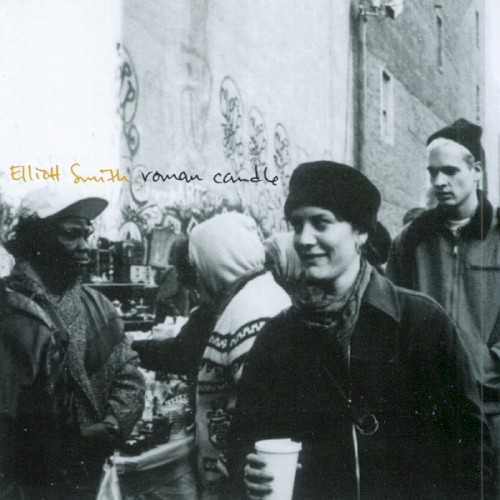 | Album: 1 of 9 Title: Roman Candle Released: 1994-07-14 Tracks: 9 Duration: 30:28 Scroll: Up Down Top Bottom 25% 50% 75% Spotify Wikipedia Allmusic AlbumCover | 1 Roman Candle (03:37) 2 Condor Ave. (03:34) 3 No Name #1 (03:03) 4 No Name #2 (03:34) 5 No Name #3 (03:13) 6 Drive All Over Town (02:36) 7 No Name #4 (02:30) 8 Last Call (04:38) 9 Kiwi Maddog 20/20 (03:40) |
| Roman Candle : Allmusic album Review : Elliott Smith began his career like most aspiring musicians in the Northwestern states: putting in the requisite hours in a grunge band. Being a team player, however, is not Smiths forte. After those buzzy shows in the bars of Portland, OR, he would retreat backstage with his acoustic guitar and whisper his own quiet songs to himself. This album is his first attempt to record those songs, and they capture that feeling perfectly: a loner retreating from the noisy tension of life with others, finding solace in musical solitude. Roman Candle was, in fact, recorded in solitude on a four-track in a basement. Smith played all the instruments himself. He has said that hes always surprised when people call his songs "sad," because playing them always made him happy. You can hear that reclusive joy in the light bounce of the melodies and hushed harmonies (which recall Simon & Garfunkel). But his lyrics are haunted by the downbeat, drug-addled life from which he was retreating. For all their cryptic cleverness, there is a restless unhappiness in his fragmented stories of alienated urbanites. After that description, a reference to the definitive folk loner, Nick Drake, is inevitable. Smiths whispery vocals and able fingerpicking deserve the comparison. The highlight of Roman Candle is the title track. The quietly driving acoustic guitars and threatening bass create a disturbing portrait of a human time bomb, barely containing a seething and simmering undercurrent of bitterness. The rest of the album, by comparison, is pure sunlight. | ||
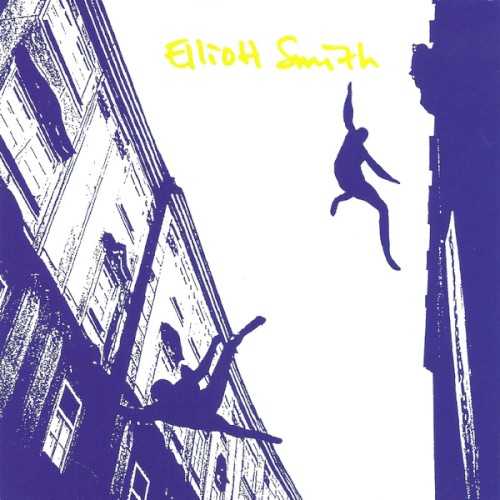 | Album: 2 of 9 Title: Elliott Smith Released: 1995-07-10 Tracks: 12 Duration: 37:23 Scroll: Up Down Top Bottom 25% 50% 75% Spotify Wikipedia Allmusic AlbumCover | 1 Needle in the Hay (04:16) 2 Christian Brothers (04:30) 3 Clementine (02:46) 4 Southern Belle (03:06) 5 Single File (02:26) 6 Coming Up Roses (03:10) 7 Satellite (02:25) 8 Alphabet Town (04:11) 9 St. Ides Heaven (03:00) 10 Good to Go (02:24) 11 The White Lady Loves You More (02:24) 12 The Biggest Lie (02:39) |
| Elliott Smith : Allmusic album Review : Elliott Smiths self-titled second album was his first for the Kill Rock Stars label and also his first major artistic statement. Its sound is fairly similar to that of Roman Candle -- its mostly just Smith and his gently fingerpicked acoustic guitar, embellished a bit more often with drums, harmony vocals, and the odd additional instrument. The main difference here is that Smiths melodies and lyrics reveal their greater strength and substance with repeated listens. And make no mistake, the songs do require repeated listens -- not just because of Smiths often whispery, spiderweb-thin delivery, but also because of his deceptively angular melodies and chord progressions, which threaten to float away until the listener hears them enough to latch on and know where theyre going. Smith is often compared to Paul Simon or the Beatles in their softer moments, but perhaps the best touchstone for this early sound is Nick Drakes even more minimalistic Pink Moon; while Smiths language is rawer and tougher than Drakes haunting poetics, his songs also deal with depression and loneliness, creating an almost uncomfortable intimacy with their bare-bones arrangements. The quiet prettiness of Smiths sound can make it easy to overlook the darker, edgier side of his songs -- many of Smiths embittered characters cope with their dysfunctional relationships or breakups through substance abuse, while some of the lyrics read more like angry, defiant punk rants when separated from the music. Smith would flesh out his sound with the albums to come, but Elliott Smith contains the blueprint for his later successes, and more importantly, its a fully realized work itself. | ||
 | Album: 3 of 9 Title: Either/Or Released: 1997-02-25 Tracks: 21 Duration: 1:03:32 Scroll: Up Down Top Bottom 25% 50% 75% Spotify Allmusic Wikipedia AlbumCover | 1 Speed Trials (03:01) 2 Alameda (03:43) 3 Ballad of Big Nothing (02:48) 4 Between the Bars (02:21) 5 Pictures of Me (03:46) 6 No Name No. 5 (03:43) 7 Rose Parade (03:28) 8 Punch and Judy (02:25) 9 Angeles (02:56) 10 Cupid’s Trick (03:04) 11 2:45 AM (03:18) 12 Say Yes (02:19) 1 My New Freedom (live) (02:48) 2 Pictures of Me (live) (03:58) 3 Angeles (live) (03:02) 4 Some Song (live) (03:14) 5 Rose Parade (live) (03:38) 6 New Monkey (live) (00:41) 7 I Don’t Think I’m Ever Gonna Figure It Out (remixed/Remastered) (01:57) 8 I Figured You Out (03:45) 9 Bottle Up and Explode! (alternate version) (03:26) |
| Either/Or : Allmusic album Review : Elliott Smiths third album sees his one-man show getting a little more ambitious. While he still plays all the instruments himself, he plays more of them. Several of the songs mimic the melody mastery of pop bands from 1960s. The most alluring numbers, however, are still his quietly melancholy acoustic ones. While the full-band songs are catchy and smart, Smiths recording equipment isnt quite up to the standards set by the Beatles and the Beach Boys. The humbler arrangements are better suited to the sparse equipment. "Between the Bars," for example, plays Smiths strengths perfectly. He sings, in his endearingly limited whisper, of late-night drinking and introspection, and his subdued strumming creates a minor-key mood befitting the mysteries of self. "Angeles" is equally ethereal -- Smiths acoustic fingerpicking spins out notes which briskly move around a single atmospheric keyboard chord, like aural minnows swimming toward a solitary light at the surface of the water. The lyrics are a darkly biting rejection of the hypercapitalist dream machinery of Los Angeles (it would make a great theme song for Smiths label, Kill Rock Stars). Ironically, "Angeles" was included on the Good Will Hunting soundtrack, which won Smith the acclaim of Hollywoods biggest, brightest, and best connected voting body, the Academy of Motion Picture Arts & Sciences. Smiths stock in L.A. soared after he took his bow at the Oscars with Celine Dion and Trisha Yearwood. It might have been more interesting had he sung "Angeles." | ||
 | Album: 4 of 9 Title: XO Released: 1998-08-24 Tracks: 14 Duration: 44:43 Scroll: Up Down Top Bottom 25% 50% 75% Spotify TrackSamples Wikipedia Allmusic AlbumCover | 1 Sweet Adeline (03:15) 2 Tomorrow Tomorrow (03:07) 3 Waltz #2 (XO) (04:38) 4 Baby Britain (03:13) 5 Pitseleh (03:22) 6 Independence Day (03:04) 7 Bled White (03:22) 8 Waltz #1 (03:22) 9 Amity (02:20) 10 Oh Well, Okay (02:33) 11 Bottle Up and Explode! (02:58) 12 A Question Mark (02:41) 13 Everybody Cares, Everybody Understands (04:25) 14 I Didn’t Understand (02:17) |
| XO : Allmusic album Review : A year before his major-label debut, XO, was released, it seemed unlikely that Elliott Smith would even be on a major, let alone having his record be one of the more anticipated releases of 1998. He had certainly earned a great deal of critical respect with his low-key, acoustic indie records and was emerging as a respected songwriter, but he hadnt made much of an impression outside of journalists, record collectors, and indie rockers. An Oscar nomination can change things, however. "Miss Misery," one of Smiths elegantly elegiac songs for Gus Van Sants Good Will Hunting, unexpectedly earned an Academy Award nomination, and he was immediately thrust into the spotlight. He was reluctant to embrace instant celebrity, yet he didnt refuse a contract with DreamWorks, and he didnt shy away from turning XO into a glorious fruition of his talents. Smiths songs remain intensely introspective, yet the lush, Beatlesque production provides a terrifically charming counterpoint. His sweetly dark melodies are vividly brought to life with the detailed arrangements, and they sell Smiths tormented songs -- its easy to get caught up in the tunes and the sound of the record, then realize later what the songs are actually about. Thats a sign of a good craftsman, and XO proves that not only can Elliott Smith craft a song, but he knows how to make an alluring pop record as well. | ||
 | Album: 5 of 9 Title: Figure 8 Released: 2000-04-17 Tracks: 16 Duration: 52:13 Scroll: Up Down Top Bottom 25% 50% 75% Spotify Allmusic AlbumCover | 1 Son of Sam (03:04) 2 Somebody That I Used to Know (02:09) 3 Junk Bond Trader (03:49) 4 Everything Reminds Me of Her (02:37) 5 Everything Means Nothing to Me (02:24) 6 LA (03:14) 7 In the Lost and Found (Honky Bach) / The Roost (04:32) 8 Stupidity Tries (04:23) 9 Easy Way Out (02:44) 10 Wouldn’t Mama Be Proud? (03:25) 11 Color Bars (02:19) 12 Happiness / The Gondola Man (05:04) 13 Pretty Mary K (02:36) 14 I Better Be Quiet Now (03:35) 15 Can’t Make a Sound (04:18) 16 Bye (01:53) |
| Figure 8 : Allmusic album Review : Judging only by his earlier, bare-bones indie-label albums, it seemed highly unlikely that Elliott Smith would turn into the ambitious arranger and studio craftsman of his lushly textured Dreamworks debut, XO. A big part of that shift, of course, was the fact that Smith had major-label finances and equipment to work with for the first time; this allowed him to fuse his melancholy, slightly punky folk with the rich sonics of pop artists like the Beatles and Beach Boys. Smith continues in that direction for the follow-up, Figure 8, an even more sonically detailed effort laden with orchestrations and inventive production touches. With a couple of exceptions, the sound of Smiths melancholy has largely shifted from edgy to sighingly graceful, although his lyrics are as dark as ever. Even if the subject matter stays in familiar territory, though, the backing tracks are another matter -- a gorgeous, sweeping kaleidoscope of layered instruments and sonic textures. Smith fleshes his songs out with assurance and imagination, and that newfound sense of mastery is ultimately the records real emphasis; theres seemingly a subtle new wrinkle to the sound of every track, and yet its all easily recognizable as trademark Smith. Even if it is a very impressive statement overall, Figure 8 isnt quite the masterpiece it wants to be -- theres something about the pacing that just makes the record feel long (at over 52 minutes, it is the longest album in Smiths catalog), and it can sometimes float away from the listeners consciousness. Perhaps its that Smiths songwriting does slip on occasion here, which means that those weaker tracks sink under the weight of arrangements they arent equipped to support. Still, most of the songs do reveal their strengths with repeated plays, and its worth the price of a few nondescript items to reap the rewards of the vast majority. Fans who miss the intimacy of his Kill Rock Stars records wont find much to rejoice about here, but overall, Figure 8 comes tantalizingly close to establishing Elliott Smith as the consummate pop craftsman hes bidding to become. | ||
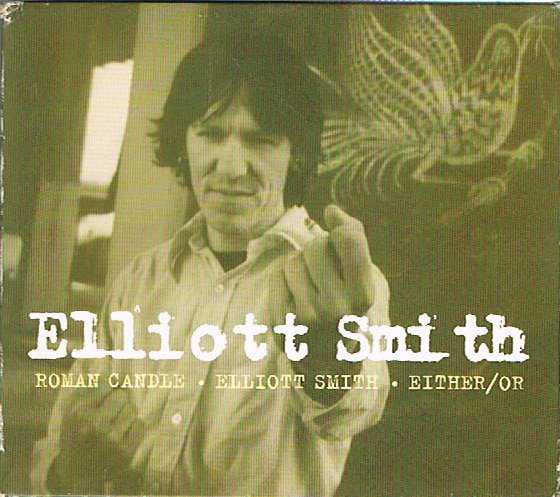 | Album: 6 of 9 Title: Roman Candle / Elliott Smith / Either/Or Released: 2001-10-22 Tracks: 33 Duration: 1:44:51 Scroll: Up Down Top Bottom 25% 50% 75% Allmusic AlbumCover | 1 Roman Candle (03:37) 2 Condor Ave. (03:34) 3 No Name #1 (03:03) 4 No Name #2 (03:34) 5 No Name #3 (03:13) 6 Drive All Over Town (02:36) 7 No Name #4 (02:30) 8 Last Call (04:38) 9 Kiwi Maddog 20/20 (03:40) 1 Needle in the Hay (04:16) 2 Christian Brothers (04:30) 3 Clementine (02:46) 4 Southern Belle (03:06) 5 Single File (02:26) 6 Coming Up Roses (03:10) 7 Satellite (02:25) 8 Alphabet Town (04:11) 9 St. Ides Heaven (03:00) 10 Good to Go (02:24) 11 The White Lady Loves You More (02:24) 12 The Biggest Lie (02:39) 1 Speed Trials (03:01) 2 Alameda (03:43) 3 Ballad of Big Nothing (02:48) 4 Between the Bars (02:21) 5 Pictures of Me (03:46) 6 No Name No. 5 (03:43) 7 Rose Parade (03:28) 8 Punch and Judy (02:25) 9 Angeles (02:56) 10 Cupid’s Trick (03:04) 11 2:45 AM (03:18) 12 Say Yes (02:19) |
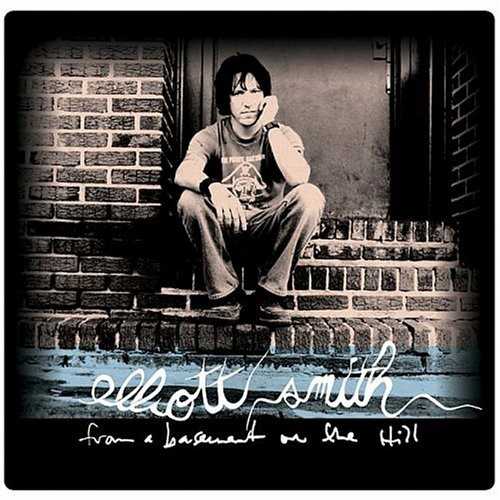 | Album: 7 of 9 Title: From a Basement on the Hill Released: 2004-10-18 Tracks: 15 Duration: 57:54 Scroll: Up Down Top Bottom 25% 50% 75% Spotify Wikipedia Allmusic AlbumCover | 1 Coast to Coast (05:34) 2 Let’s Get Lost (02:27) 3 Pretty (Ugly Before) (04:45) 4 Don’t Go Down (04:34) 5 Strung Out Again (03:12) 6 A Fond Farewell (03:58) 7 King’s Crossing (04:58) 8 Ostrich & Chirping (00:32) 9 Twilight (04:29) 10 A Passing Feeling (03:32) 11 The Last Hour (03:27) 12 Shooting Star (06:01) 13 Memory Lane (02:30) 14 Little One (03:15) 15 A Distorted Reality Is Now a Necessity to Be Free (04:34) |
| From a Basement on the Hill : Allmusic album Review : Almost exactly a year after his untimely death -- missing the anniversary by just two days -- Elliott Smiths final recordings were released as the From a Basement on the Hill album. Smith had been working on the album for a long time. His last album, Figure 8, had appeared in 2000, and when it came time to record its follow-up, he parted ways with both his major label, Dreamworks, and his longtime producer/engineer, Rob Schnapf, working through a number of different producers, including L.A. superproducer Jon Brion, before recording a number of sessions with David McConnell, which were supplemented with Smiths home recordings. At the time of his death, Smith was still tinkering with the album. There was no final track sequence and only a handful of final mixes; it was closer to completion than Jeff Buckleys Sketches for My Sweetheart the Drunk, which he intended to re-record, but it was still up to his family to finalize the record. For various reasons, the family chose to work with Schnapf and Joanna Bolme -- a former girlfriend of Smith and current member of Stephen Malkmus Jicks -- instead of McConnell, who went on record with Kimberly Chun of The San Francisco Bay Area Guardian the week before the release of From a Basement to state that this album was not exactly what Smith intended it to be. According to McConnell, as well as Elliott Smith biographer Benjamin Nugent, Smith wanted the album to be rough and ragged, and McConnell told Chun that "obviously Elliott did not get his wishes," claiming that three of the songs on the album were considered finished by both him and Smith, but appear on the record in different mixes. Its hard to dispute that Smith did not get to finalize the mixes, the track selection, or the sequencing -- he died, after all, with the album uncompleted -- but thats the nature of posthumous recordings: theyre never quite what might have appeared had the artist lived. Critics, fans, and historians can have endless debates about whether this particular incarnation of the songs on From a Basement on the Hill would have been what would have been heard if Smith had finished the record, but that doesnt take away from the simple fact that the music here is strong enough to warrant a release, and that it offers a sense of resolution to his discography. While its likely that From a Basement is cleaner than what Smith and McConnell intended, it is much sparer than Figure 8, and it feels at once more adventurous, confident, and warmer than its predecessor. Perhaps its not "the next White Album," which is what McConnell claims it could have been, but it has a similarly freewheeling spirit, bouncing from sweet pop to fingerpicked acoustic guitars to fuzzy neo-psychedelic washes of sound. Its not far removed from Smiths previous work, but it feels like a step forward from the fussy Figure 8 and more intimate than XO. The most surprising twist is that despite the occasional lyrics that seem to telegraph his death (particularly on "A Fond Farewell"), its not a crushingly heavy album. Like the best of his music, From a Basement on the Hill is comforting in its sadness; its empathetic, not alienating. Given Smiths tragic fate, it also sadly seems like a summation of his work. All of his trademarks are here -- his soft, sad voice, a fixation on 60s pop, a warm sense of melancholy -- delivered in a strong set of songs that stands among his best. It may or may not be exactly what Elliott Smith intended these recording sessions to be, but as it stands, From a Basement on the Hill is a fond farewell to a singer/songwriter who many indie rockers of the 90s considered a friend. | ||
 | Album: 8 of 9 Title: New Moon Released: 2007-05-07 Tracks: 24 Duration: 1:13:29 Scroll: Up Down Top Bottom 25% 50% 75% Spotify Wikipedia Allmusic AlbumCover | 1 Angel in the Snow (02:37) 2 Talking to Mary (03:42) 3 High Times (03:11) 4 New Monkey (03:12) 5 Looking Over My Shoulder (03:39) 6 Going Nowhere (03:51) 7 Riot Coming (03:43) 8 All Cleaned Out (02:57) 9 First Timer (02:41) 10 Go By (03:46) 11 Miss Misery (early version) (02:56) 12 Thirteen (02:43) 1 Georgia, Georgia (01:46) 2 Whatever (Folk Song in C) (02:17) 3 Big Decision (02:00) 4 Placeholder (02:30) 5 New Disaster (04:10) 6 Seen How Things Are Hard (03:21) 7 Fear City (03:29) 8 Either/Or (02:27) 9 Pretty Mary K (other version) (03:24) 10 Almost Over (02:11) 11 See You Later (02:54) 12 Half Right (03:50) |
| New Moon : Allmusic album Review : Before he died in 2003, Elliott Smith released five albums (plus the posthumous From a Basement on the Hill), but he had dozens and dozens of songs recorded, either alone on a four track or with friends in various studio settings, that had never seen the light of day. Kill Rock Stars -- the label for which he made arguably two of his best records, 1995s Elliott Smith and 1997s Either/Or -- with help from the late singers archivist, Larry Crane, collected a handful of these pieces, added extensive and often personal liner notes, and made them available to the public under the title New Moon. Written and recorded between 1994 and 1997, the 24 tracks on New Moon showcase Smith at his most instinctive and natural, when he uses hardly more than his (double-tracked) voice and his guitar. Though some of the songs here, especially the earlier ones, can be quite simple, even raw at times, theres a sad, clean sweetness that comes through despite the occasional bit of tape hiss, of tinny chords. In fact, much was done by the albums producers to maintain the integrity of Smiths original tracks, remixing them only when absolutely necessary (the only song that took vocal and instrumental elements from two different sessions is "New Disaster," and is clearly marked as such). This means that New Moon embodies an unadulterated Smith, singing and playing songs how he wanted to, carefully layering his voice and adding the occasional harmony, the second guitar, the subtle drum tap -- and with little of the full-band sound he moved into after he left KRS and went to a major label -- but it doesnt mean that the pieces sound incomplete or unprofessional; almost all them couldve been included on one of Smiths albums, and in fact many of them were near to making the cut. "Looking Over My Shoulder" has a great hook, catchy in that monotonously melodic kind of way Smith knew how to do best. "Youre always coming over with all of your friends and all their opinions I dont want to know," he sings, a slight anger in his voice, while "All Cleaned Out" reveals a kind of pity for his subject. Theres a depth of emotion in New Moon, more than pure sadness, seen in his cover of Big Stars "Thirteen," recorded live in DJ Rob Joness basement and played back later on air, the near indignation of "Georgia, Georgia," the fast picking on "Almost Over." Even the rendition of "Miss Misery" included here, the song that propelled him into the spotlight, has a lightness that doesnt exist in the final product. Instead of that hauntingly sad refrain, that last plea, "Do you miss me, miss misery like you say you do?" Smith hints at a different ending. "Cause its all right, some enchanted night Ill be with you," he sings. Theres distant hope for redemption, for resolution here, something that was not present in the later version. In fact, thats the overall feeling that New Moon gives, a sense of opportunity, of possibility, of life within the bleak reality. The album portrays a more stable Smith and promises something brilliant to come, full of words and chords that will touch thousands, alluding to the future and the past, but mostly, in its own quiet way, screaming to show off the immense talents of one man and his songs. | ||
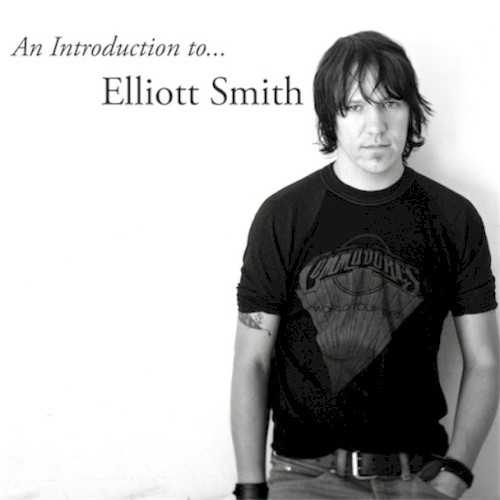 | Album: 9 of 9 Title: An Introduction to… Elliott Smith Released: 2010-11-01 Tracks: 14 Duration: 51:58 Scroll: Up Down Top Bottom 25% 50% 75% Spotify Allmusic AlbumCover | 1 Ballad of Big Nothing (02:48) 2 Waltz #2 (XO) (04:38) 3 Pictures of Me (03:46) 4 The Biggest Lie (02:39) 5 Alameda (03:43) 6 Between the Bars (02:21) 7 Needle in the Hay (04:19) 8 Last Call (04:38) 9 Angeles (02:56) 10 Twilight (04:29) 11 Pretty (Ugly Before) (04:45) 12 Angel in the Snow (02:38) 13 Miss Misery (early version) (02:56) 14 Happiness (05:16) |
| An Introduction to… Elliott Smith : Allmusic album Review : Elliott Smiths tragic death in 2003 left a gaping wound in the indie rock community. There weren’t many singer/songwriter/producers around who could make music so raw and honest, so personal and universal, that it could touch you no matter how it was presented. Just Smith and a four-track in his bedroom or sitting behind the piano at Abbey Road, it didn’t matter. His songs meant a lot to a lot of people and his records have become treasured parts of people’s lives. This collection gathers up songs from throughout his career, taking tracks from each of Smiths albums and the two posthumous compilations that were released. The songs are extremely well chosen and give a glimpse of Smith both as a harrowingly honest writer and an amazingly gifted creator of memorable pop songs. It’s a fine starting point for someone looking to discover Smith, but even if you have all his albums, it serves as a greatest-hits collection of sorts and only confirms just how awful not having him here truly is. | ||